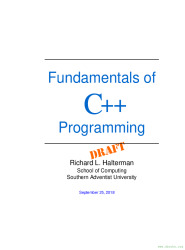Fundamentals of C++ Programming
C++ initially provided object-oriented programming features (see Chapter 13 and Chapter 14) and later added generic programming capabilities. C++ 's close relationship to C allows C++ programs to utilize a large collection of code developed in C.
C++ is widely used in industry for commercial software development. It is an industrial strength programming language used for developing complex systems in business, science, and engineering. Examples of software written in C++ include Microsoft Windows 8, Microsoft Office, macOS, and Adobe Creative Suite.
In order to meet the needs of commercial software development and accomplish all that it does, C++ itself is complex. While experienced programmers can accomplish great things with C++ , beginners sometimes have a difficult time with it. Professional software developers enjoy the flexible design options that C++ permits, but beginners need more structure and fewer options so they can master simpler concepts before moving on to more complex ones.
This book does not attempt to cover all the facets of the C++ programming language. Experienced programmers should look elsewhere for books that cover C++ in much more detail. The focus here is on introducing programming techniques and developing good habits. To that end, our approach avoids some of the more esoteric features of C++ and concentrates on the programming basics that transfer directly to other imperative programming languages such as Java, C#, and Python. We stick with the basics and explore more advanced features of C++ only when necessary to handle the problem at hand.
Table of contents
- The Context of Software Development
- Writing a C++ Program
- Values and Variables
- Expressions and Arithmetic
- Conditional Execution
- Iteration
- Other Conditional and Iterative Statements
- Using Functions
- Writing Functions
- Managing Functions and Data
- Sequences
- Sorting and Searching
- Standard C++ Classes
- Custom Objects
- Fine Tuning Objects
- Building some Useful Classes
- Inheritance and Polymorphism
- Memory Management
- Generic Programming
- The Standard Template Library
- Associative Containers
- Handling Exceptions
- Command Line Development
| Pages : | 766 |
| Size : | 12.8 MB |
| File type : | |
| Downloads: | 157 |
| Created: | 2022-02-02 |
| License: | CC BY |
| Author(s): | Richard L. Halterman |

Warning: Trying to access array offset on false in /home/tutovnfz/public_html/article.php on line 233
Others programming Tutorials
Introduction to Programming with Fortran
Haskell Tutorial for C Programmers
Programming from the Ground Up: An Introduction to Programming using Linux Assembly Language
Professor Frisby's Mostly Adequate Guide to Functional Programming
Others related eBooks about Fundamentals of C++ Programming
Learning AndroidA complet Android Course in PDF format, this is a free Android ebook created for educational purposes by Stack Overflow documentation....
C++ Programming LanguageThis PDF course explains the features, technical details and syntaxes of the C++ programming language. To be a proficient programmer, you need to master two things: the syntax of the programming language, and the core libraries (i.e., API) associated with the language....
Neural Networks with JavaScript SuccinctlyDownload free course Neural Networks with JavaScript Succinctly, pdf file on 163 pages by James McCaffrey....
Automated Machine LearningDownload free course Automated Machine Learning, pdf file on 223 pages by by Frank Hutter, Lars Kotthoff, Joaquin Vanschoren....
XcalableMP PGAS Programming LanguageDownload free course XcalableMP PGAS Programming Language, pdf file on 265 pages by Mitsuhisa Sato....
The Basics of Game DesignDownload this ebook intituled The Basics of Game Design, free training document about video game development on 24 pages for beginners....
A Whirlwind Tour of PythonA Whirlwind Tour of Python is a fast-paced introduction to essential features of the Python language, aimed at researchers and developers who are already familiar with programming in another language. The material is particularly designed for those who wish to use Python for data science and/or scie...
Android Notes for ProfessionalsDownload free course Android Notes for Professionals, pdf file on 1329 pages by by Stack Overflow Community....
Professor Frisby's Mostly Adequate Guide to Functional ProgrammingThis is a book on the functional paradigm in general. We'll use the world's most popular f..., download free Functional Programming tutorial in PDF (146 pages) created by Brian Lonsdorf ....
The Coder's ApprenticeThe Coder's Apprentice is a course book, written by Pieter Spronck, that is aimed at teach..., download free Coding tutorial in PDF (398 pages) created by Pieter Spronck ....